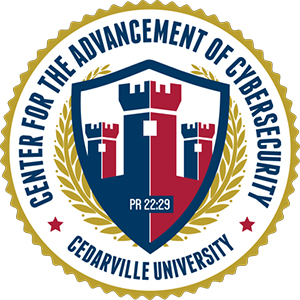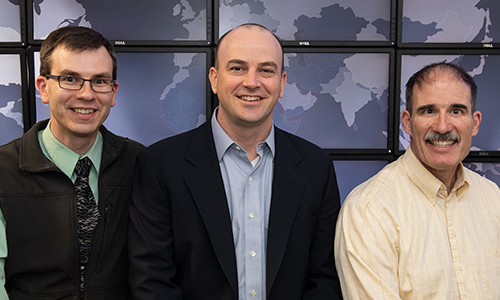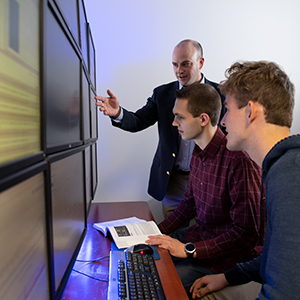by Jeff Gilbert
Cedarville's programs and students are regularly recognized for excellence. From the National Security Agency naming our cyber program a National Center of Academic Excellence in Cyber Operation to 100% of social work students passing their professional exam and 100% of our students sitting for the Law School Admissions Test being admitted to law school, to athletics receiving the NCAA Division II Presidents' Award for Academic Excellence nine times in a row, these external verifications offer proof of the excellence our students experience and exemplify every day.
Cedarville’s rise in training students to work in cyber operations began with a conversation between faculty members. That conversation led to a strategically executed Ph.D. path for Seth Hamman, Associate Professor of Cyber Operations and Computer Science, which led to a specialization for computer science majors and, eventually, a new major with 33 students.
That first conversation between Hamman and David Gallagher, Senior Professor of Computer Science, one of the founders of Cedarville’s computer science program, happened in 2012. Ten years later, Cedarville is a forerunner in cyber operations education and is the premier school in Christian higher education to offer such a major.
FAST-TRACK
 Relatively speaking, Cedarville’s program has grown as fast as a computer hacker pounds a keyboard and discovers crucial information on your favorite TV show.
Relatively speaking, Cedarville’s program has grown as fast as a computer hacker pounds a keyboard and discovers crucial information on your favorite TV show.
That Cedarville’s program is one of the most highly regarded in the nation is not a marketing slogan. The young program is one of 22 to receive the National Security Agency’s (NSA) highest recognition as a National Center of Academic Excellence in Cyber Operations.
“For Cedarville to be on that list to me is a marvel,” Hamman said. “It’s an elite type of distinction. And we geared up for it; we targeted it; we built around it. And then, by God’s grace, it happened.”
The scholarship and career opportunities with defense contractors and the intelligence community are abundant.
The Department of Defense (DOD) is funding seven Cedarville students (three seniors, four juniors) with full scholarships, $25,000 a year in living expenses, and an internship. In return, the students are committed to work two years with the DOD after graduation.
“Our government is investing huge resources into cyber education because we have a pipeline problem,” Hamman said. “We desperately need to produce more cyber talent.”
After the Cedarville students complete their two-year DOD commitment, they can stay or move into the private sector — likely to a defense contractor — and make a higher salary. The first out-of-college jobs are bordering on six figures because the demand is so high.
“It’s a good time to be tech-oriented because there’s a huge demand and short supply,” Hamman said. “The job prospects are incredible.”
CYBER DEFENDERS
 Hamman says the demand exists because cyberattacks are the nation’s foremost national security concern. For this reason, the University launched the Center for the Advancement of Cybersecurity in 2018. The center focuses on advancing cybersecurity in our nation by developing tomorrow’s cyber leaders in the classroom, shaping cyber education in the academy, and promoting cyber awareness in society. The center will increase Cedarville’s opportunity for influence as more issues develop with cyberattacks.
Hamman says the demand exists because cyberattacks are the nation’s foremost national security concern. For this reason, the University launched the Center for the Advancement of Cybersecurity in 2018. The center focuses on advancing cybersecurity in our nation by developing tomorrow’s cyber leaders in the classroom, shaping cyber education in the academy, and promoting cyber awareness in society. The center will increase Cedarville’s opportunity for influence as more issues develop with cyberattacks.
The center’s move to the Scharnberg Business Center, which is slated to begin construction this fall, should only raise cyber’s profile on campus and in the professional ranks.
“Cybersecurity underpins the entire intelligence and military apparatus,” Hamman said.
“Nations are not going to war, but they’re making strategic gains against one another in terms of espionage and other types of activities. When we read about China and Russia in the news it’s usually because of some kind of cyber operation, some kind of hack.”
Cedarville’s cyber program is also one of 350 schools with the National Security Agency’s designation as a National Center of Academic Excellence in Cyber Defense. Cedarville is one of just two schools that hold both NSA designations and the Accreditation Board for Engineering and Technology (ABET) Cybersecurity accreditation.
“It’s an additional indicator that we’re building our cyber program the right way,” Hamman said. “We’re teaching the right content. We are doing the right activities, such as cyber competitions and service to the community. We’ve been scrutinized and vetted by peers.”
INDUSTRY RECOGNITION
 This past fall, the program was named one of the top 16 cyber education programs in the U.S. by the Chief Information Officers Institute. It’s getting hard to keep up with all the accolades.
This past fall, the program was named one of the top 16 cyber education programs in the U.S. by the Chief Information Officers Institute. It’s getting hard to keep up with all the accolades.
So how did Cedarville become a leader so fast in this fledgling academic discipline?
The discussion began when Hamman arrived at Cedarville in 2012 to teach computer science. The topic of conversation was what kind of doctoral program should he pursue. That’s when Gallagher floated the cyber idea.
Gallagher and Keith Shomper, Professor of Computer Science and Cyber Operations, and Bob Schumacher, Associate Professor Emeritus of Mathematics, were the founding members of the computer science program.
They are Air Force veterans and had ties to the Air Force Institute of Technology (AFIT) graduate school at nearby Wright- Patterson Air Force Base.
Hamman said Gallagher noticed the growth of cyber and that computer science majors were getting jobs in cybersecurity. Why not start a program?
Hamman began his doctoral work in computer science at AFIT with an eye toward starting the cyber program at Cedarville. He focused his research on cyber operations. Hamman and his colleagues also studied the program requirements the NSA follows in awarding the distinction as a Center of Academic Excellence in Cyber Operations. AFIT already had that distinction.
“While I’m studying for my Ph.D. and working on my dissertation, all the time in the background I was doing reconnaissance, thinking, ‘How can we replicate this at Cedarville?’” Hamman said. “I was particularly concerned with how we could offer all the necessary academic content.”
A key piece of the puzzle was the hiring of Patrick Dudenhofer ’04, Assistant Professor of Computer Science and Cyber Operations, in 2014. He immediately enrolled in a Ph.D. program at Wright State University and chose software reverse engineering as his research area — a crucial cyber operations skill that was lacking among the faculty. Shomper was able to leverage his extensive programming knowledge to round out the deeply technical academic content that distinguishes a cyber operations program.
Hamman completed his degree in 2016 and Hamman, Dudenhofer, and Shomper created the three new elective courses that comprise the computer science major’s cyber operations specialization. Students were eager to take those classes and went straight into cyber jobs.
In the fall of 2020, the cyber operations specialization was expanded into a major and welcomed its first freshman class. This year there are 33 freshmen and sophomores in the major. And Cedarville stands alongside those 21 other schools as the top tier, according to the NSA. Those other schools are military academies and mostly larger state schools.
Accreditation is an important step in the academic world, and Cedarville can claim that too. ABET is the gold standard for being accredited. ABET started a pilot program for accrediting cyber programs, and Cedarville was one of the first seven schools to be accredited.
THE NEXT GENERATION
Cedarville is also involved in building interest in the field among high school students. Students across Ohio can log into the Ohio Cyber Range at no cost and do cyber exercises on virtual machines in the cloud. Cedarville is a Regional Programming Center recognized by the Ohio Cyber Range Institute located at the University of Cincinnati. Hamman, with the help of students and a grant, creates curriculum for the cyber range.
The proof that the momentum has been building longer than Hamman has been at Cedarville is evidenced by a former student who is on campus this spring as a visiting professor. Ben Sprague ’06 works in the cyber field, and the faculty jokingly refer to him as the Hacker-in-Residence.
“It’s an emerging academic discipline and this is its golden age,” said Hamman, who has written academic journal articles about teaching cyber operations. “Fifty years ago, there were no computer science majors or degrees. We are a part of birthing a new academic discipline.”
Jeff Gilbert ’87 is an Assistant Professor of Journalism and advisor to the student newspaper, Cedars.
…..
NEW PLACE TO SHINE
The Center for the Advancement of Cybersecurity will soon shine in its new home in the Scharnberg Business Center. This contemporary space will feature faculty offices, a classroom, space for industry-sponsored research and senior design projects, and a glass-enclosed collaboration area. A beautiful veranda facing Cedar Lake will be the site of alumni and industry partner receptions.
To learn how you can support the Center for the Advancement of Cybersecurity with your gifts, visit cedarville.edu/Scharnberg. You can also email advancement@cedarville.edu or call 937-766-7810.



















